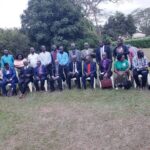Malawi Government is selfish – Nkhoma CCAP Synod
Published on April 2, 2012 at 10:55 AM by FACE OF MALAWI
 The Nkhoma CCAP Synod says there are very few good things happening in Malawi, with a lot of pain being experienced by people due to poor governance, nepotism and selfish government decisions.
The Nkhoma CCAP Synod says there are very few good things happening in Malawi, with a lot of pain being experienced by people due to poor governance, nepotism and selfish government decisions.
The synod has said this in a pastoral letter read out in its congregations on Palm Sunday entitled Exercising our Faith through Prayer in our Time, in our Nation which quotes Matthews 5 verses 13-16 as its guiding principle.
There was no immediate reaction from government as Minister of Information and Civic Education Patricia Kaliati, who is the official government spokesperson, did not answer her cellphones. Presidential spokesperson Hetherwick Ntaba was also not available.
Kapita CCAP Church in Lilongwe’s Area 18 was fully packed with civil servants working at Capital Hill and employees of international and private sector organisations when the Reverend Arnold Kalemba Saka announced to the congregation that there was a pastoral letter to be read out. The congregation was visibly excited.
The letter, signed by Nkhoma CCAP Synod moderator the Reverend Vasco Kachipapa and church clerk the Reverend Brian Kamwendo, says, in part: “While we undergo the pains and afflictions of this life caused by social imbalances and injustices, we are liberated through the suffering, death and resurrection of our Master Jesus Christ. Earthly governments come and go, but heavenly government in which we put our faith will never come to an end.”
Reading the highly-critical letter, which also notes President Bingu wa Mutharika is yet to honour his K10 million (about $59 880) pledge to the church made in June 2011, Kalemba Saka said personally he did not agree with the letter’s inclusion of freedom of expression as one of the positives in Malawi at the moment.
Malawi’s social challenges
The pastoral letter starts by bemoaning social challenges—it lists as the devil, witchcraft; and homosexuality—while appealing to the faithful not to sell their food harvests this year to “unscrupulous traders” and asking them to diversify their food production.
The letter lists down positives as sustained multiparty system of government, freedom of worship and that Malawi is a God-fearing nation, the absence of physical war, freedom of political choice and association, and freedom of expression.
Says the letter: “We have to pray for the State President and his Cabinet for their health to govern this nation with sober minds and concern for all Malawians without bias along tribal, regional and political party affiliation lines. People occupying senior public positions should be appointed only on merit.”
The letter says it is sad that senior politicians are publicly proclaiming that public contracts are to be awarded based on affiliation to the ruling party, calling it a “devastating and misleading philosophy in a multiparty government.”
States the letter: “We have to pray that government should not entice our traditional chiefs with material gifts into party politics and use them to propagate any political agenda of the government. They [traditional leaders] are leaders of all people, with different political affiliations. Traditional leaders deserve their natural respect acquired by birth.”
‘Pray against corruption’
The church calls its faithful to pray against corruption which, it notes, has gone into every sector.
The letter calls for prayers for members of Parliament whom it says are now influenced by party bias as evidenced by the passing of unpopular bills such as Section 46 of the Penal Code against the media, the Injunctions Bill and the Pensions Act.
The synod notes that the continued shortage of fuel and foreign exchange has caused acceleration in the rising of prices for essential commodities which has affected Malawians, especially in rural areas.
“We have to pray against the alleged acts of political violence ascribed [to] some [political] party youth wings, pray against unprofessional execution of duties by some members of the Malawi Police Service in handling demonstrations. Using live ammunition during peaceful demonstrations of July 20 2011 on the ordinary citizens and the killing of some is a shame to government,” says the pastoral letter.
It also notes with concern the manner in which government handled the just-ended two and a half months Judiciary strike and poor relations between Malawi and its neighbours, the donor community and local civil society groups.
The synod, which is dominant in the Central Region, has also taken a swipe at government for relocating the proposed Lilongwe University of Science and Technology (Lustech) and the Chinese-funded National Stadium project to Thyolo and Blantyre, respectively, without convincing reasons.
Says the letter: “We need to pray against such poor and selfish decisions by government. The move of the proposed Lustech from Lilongwe to Ndata Farm in Thyolo and the stadium to Blantyre have left us, as a church, concerned. These projects could have afforded our faithful and other people resident in the Central Region jobs and business opportunities.”
The synod also bemoans the monopoly of trading opportunities, arguing that there are few individuals and organisations that are given chances to invest in many businesses and contracts to the disadvantage of many small-scale businesses.
The church has appealed to its faithful to check against the sale of alcohol in sachets which it says is unregulated and accessible to minors; indecent dressing which it argues is provocative and inviting; early marriages and pornography.


